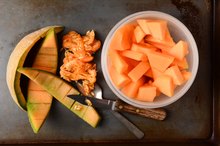Ingredients in Focus Factor
While many supplements promise to build up your body and enhance physical ability and appearance, Focus Factor concentrates on your brain. This supplement contains a blend of 40 ingredients, which its manufacturer claims can improve your mental ability and enhance memory. While some of the ingredients in Focus Factor offer benefits, you should research them thoroughly to understand how they work. In addition, you should consult a doctor before taking any supplements, as they may be ineffective or even harmful.
Choline
Choline is a molecule that, according to the website World's Healthiest Foods, is involved with nervous system communication and the function of your cell membranes. Choline is found in egg yolks, peanuts, cauliflower and oats, among other foods. While choline does effect the nervous system, the University of California at Berkeley notes that "there is no evidence that consuming extra choline will do anything for memory."
Vinpocetine
Citicoline Vs. Choline
Learn More
Vinpocetine is an extract from the periwinkle plant that my have beneficial effects for your nervous system. According to research from the journal Neurochemistry International, vinpocetine displayes neuroprotective characteristics, especially in terms of preventing against damage from excess glutamate. This research also noted that combining vinpocetine with other substances has more significant effects than vinpocetine alone. There is no guarantee the vinpocetine in Focus Factor will protect you from neural damage.
- Vinpocetine is an extract from the periwinkle plant that my have beneficial effects for your nervous system.
- According to research from the journal Neurochemistry International, vinpocetine displayes neuroprotective characteristics, especially in terms of preventing against damage from excess glutamate.
DMAE
DMAE, which is an abbreviation for dimethylethanolamine, is a compound sometimes used to treat depression. As the University of California at Berkeley notes, DMAE helps your body produce choline and has a long list of purported benefits, from increasing intelligence to reducing wrinkles. The university notes, however, that it's "very unlikely that DMAE can do any of this."
L-glutamine
Does Taurine Help With Weight Loss?
Learn More
L-glutamine is an amino acid that is associated with muscle recovery, but it can also have benefits for your brain. Research from the Journal of Nutrition indicates that glutamine is transported to neurons, where it is converted to glutamate, which is necessary for neurotransmission, which is how your brain communicates with your body. Glutamine is included in Focus Factor to provide more glutamate for neurotransmissions, but there is no guarantee of its efficacy.
DHA
DHA, or Docosahexaenoic acid, is an Omega 3 fatty acid that can be found in fish such as salmon. According to research from the journal, Neurobiology of Aging, DHA may be helpful in slowing the decline of cognitive abilities associated with aging. This research suggests that DHA can help reduce the rate of memory decline, though it was not effective for slowing reductions in cognitive abilities of older individuals.
Related Articles
References
- World's Healthiest Foods: Choline
- "Neurochemistry International"; Effects of Vinpocetine on mitochondrial function and neuroprotection in primary cortical neurons; K Tamok et al; December 2008
- "Journal of Nutrition"; Compartmentation of Brain Glutamate Metabolism in Neurons and Glia; Y Daikhin and M Yudkoff; April 2000
- "Neurobology of Aging"; Omega-3 fatty acids and cognitive decline: modulation by ApoEepsilon4 allele and depression; C Samieri et al; June 2010
- Caldenhove S, Sambeth A, Sharma S, Woo G, Blokland A. A Combination of Nootropic Ingredients (CAF ) Is Not Better than Caffeine in Improving Cognitive Functions. Journal of Cognitive Enhancement. 2017;2(1):106-113. doi:10.1007/s41465-017-0061-0.
- Campbell BI, Colquhoun RJ, Zito G, et al. The effects of a fat loss supplement on resting metabolic rate and hemodynamic variables in resistance trained males: a randomized, double-blind, placebo-controlled, cross-over trial. J Int Soc Sports Nutr. 2016;13:14. doi:10.1186/s12970-016-0125-z
Writer Bio
Brian Willett began writing in 2005. He has been published in the "Buffalo News," the "Daytona Times" and "Natural Muscle Magazine." Willett also writes for Bloginity.com and Bodybuilding.com. He is an American Council on Exercise-certified personal trainer and earned a Bachelor of Arts in journalism from the University of North Carolina.









